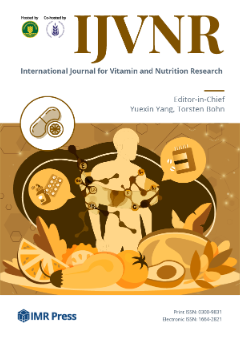International Journal for Vitamin and Nutrition Research (IJVNR) is published by IMR Press from Volume 95 Issue 1 (2025). Previous articles were published by another publisher under a hybrid publishing model, and they are hosted by IMR Press on imrpress.com as a courtesy and upon agreement with Hogrefe.
Grape seed extract supplementation in non-alcoholic fatty liver disease
Background: Despite rising non-alcoholic fatty liver disease (NAFLD) prevalence and its impact on liver health, there’s a lack of studies on grape seed extract’s (GSE) effect on oxidative stress and quality of life (QoL) in NAFLD patients. This study aims to fill this gap by the potential benefits of GSE in reducing oxidative stress and improving QoL. Methods: In this randomized clinical trial study, fifty patients with NAFLD were randomly assigned to receive either 2 tablets of GSE containing 250 mg of proanthocyanidins or placebo (25 participants in each group) for two months. QoL was evaluated using the SF-36 questionnaire, and oxidative stress variables (TAC, MDA, SOD, GPx, CAT, and IL-6) were measured at the beginning and end of the study. Results: Compared with the control group, the group supplemented with GSE experienced greater reductions in IL-6 and MDA (3.14±1.43 pg/ml vs. 2.80±0.31 pg/ml; 4.16±2.09 μM vs. 4.59±1.19 μM, p for all <0.05), as well as greater increases in TAC, SOD, and GPx levels (0.18±0.08 mM vs. –0.03±0.09 mM; 10.5±6.69 U/ml vs. 8.93±1.63 U/ml; 14.7±13.4 U/ml vs. 8.24±3.03 U/ml, p for all <0.05). Furthermore, the QoL questionnaire showed that physical limitations, general health, and total physical health were significantly improved in the GSE group compared with the placebo (17.0±42.0 vs. –12.0±37.5; 3.80±14.8 vs. –3.92±9.55; 5.08 5.26 vs. –7.01±13.7, p for all <0.05). Conclusions: GSE can be effective in improving oxidative stress and QoL in patients with NAFLD. More studies are needed to confirm the results of this study.

